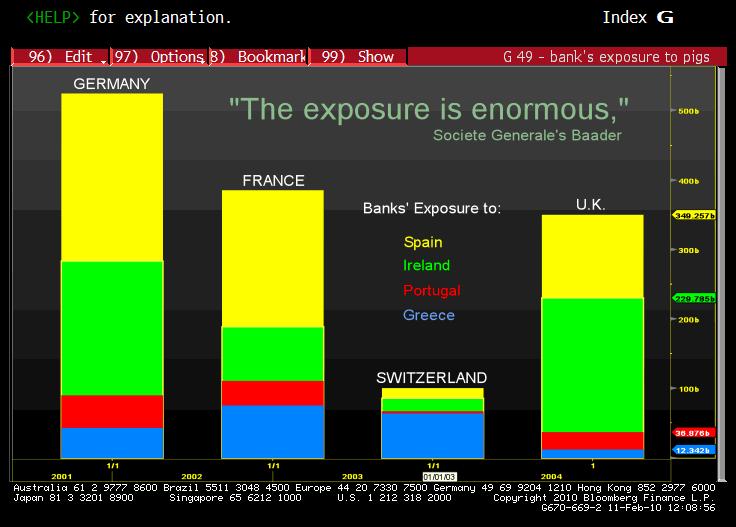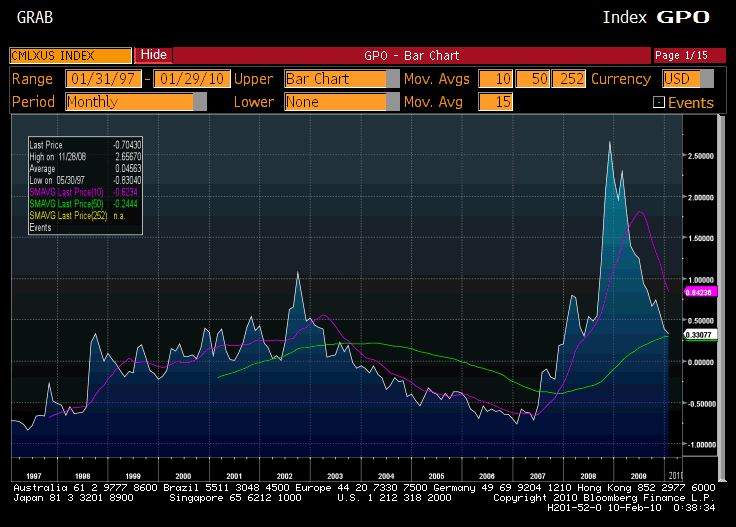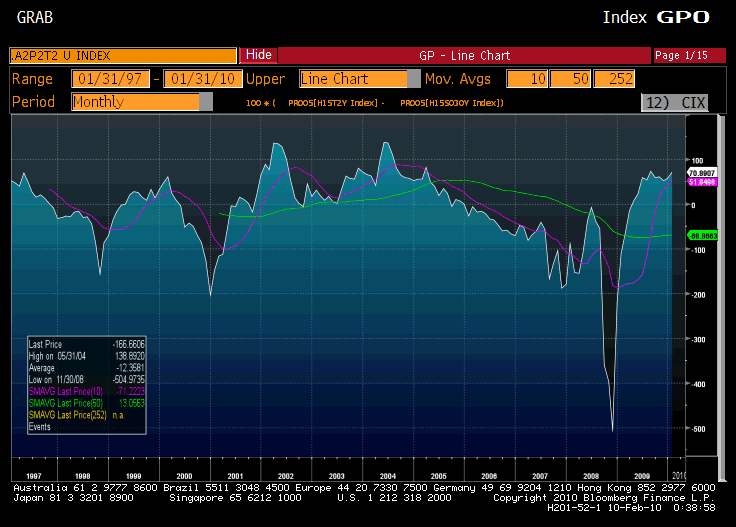1) After reading a piece on Falkenblog yesterday, I decided to add up all of the profits from Fannie and Freddie over the last 20 years.? Ready for how much they made?? Ta-da!? They lost $114 billion.
When writing at RealMoney, I was always skeptical of the GSEs, and felt that they were too lightly reserved, because eventually they would run into a situation where real estate prices would fall.
2) Bruce Krasting comments on the solvency of the FHA.? I comment:
“I’ve argued that FHA would go negative for some time. Even the FDIC is engaged in a bit of chicanery by fronting future premiums forward to avoid borrowing from the Treasury.
We may avoid a banking crisis — at the cost of a sovereign crisis.”
3) I probably have a longer post coming on the paradox of thrift, that bogus concept that Keynes put forth.? But Paul Kedrosky crystallized it for me when he posted this.? And so I wrote:
The problem with the “paradox of thrift” is that it assumes there is only one way to save. Same for the “paradox of toil.” It assumes that all work is interchangeable and uniform.
The aggregation of all saving and all labor is necessary to make these models work mathematically, but isn’t valid in real life.
Yes, if everyone tries to do the same thing, stupid things happen, like bubbles from overinvesting. If there only a fixed possible number of tasks, and people work longer hours, it takes fewer people to do them.
But there are many opportunities, including ones that we don’t presently know about. Businesses that no one could imagine before the crisis can spring out of hard times.
This paper oversimplifies the economy. If the economy were that simple, he would be right. But the economy is not that simple.
4) I don’t know if the Volcker Rule will be eliminated or not, but I do know that the same ends could be achieved through changes in the risk-based capital formulas.? What I wrote:
The same ends of the Volcker Rule can be accomplished through adjusting the risk-based capital formulas ? Equity-like risks should be funded through a 100% allocation of equity. Few banks would take on that level of speculation at that level of capital used.
If you need proof, look at the life insurance industry. Companies used to hold a lot more equities prior to the tightening of RBC rules. Now they hold little, except at a few mutual companies that are flush with capital.
For another off-the-wall idea: ban interstate banking, and let the states rule all depositary institutions. Results: No more too big to fail, and you get back ?scaredy cat? regulators who don?t let banks deal in anything they don?t understand, which isn?t much.
That also has preserved the insurance business in this crisis, leaving aside mortgage and financial risks, where the state regulators still have no idea what they are doing ? that a proper reserve level would leave most of the companies insolvent today, but had it been implemented ten years ago, would have preserved the companies, but eliminated much of their profits.
But Life and P&C insurers survive the process because of RBC, and ?scaredy cat? state regulators. What a great system, which prior to the crisis, was criticized as behind the times.
PS ? if we ever get a national regulator of insurance, there will be a big boom and bust, much as in banking at present. It is easier to corrupt one regulator than fifty.
5) Is the stock market overvalued?? Probably, but consider this article here.? I wrote:
truth, P/Es are best related to corporate yields, not deposit rates or government bonds. And, you have to flip them to be E/Ps. Current E/P on the S&P 500 is 5.4%. A dividend yield of 2.05% is 38% which is close to the long run average.
The longest corporate series that I have is the Moody?s Baa series ? because of the growth inherent in stocks, for bonds to be the better deal versus stocks, Baa bonds need a 3.9% premium over the earnings yield, or a yield of 9.3% in the present environment.
So, I?ll take it back, because the present Baa yield 6.45% augurs in favor of stocks versus bonds. Not crazy about bonds in this environment ? few categories offer good risk-adjusted yields. Now, maybe both are overvalued vs. commodities, but that one I don?t know.
6) Perhaps the phrase “Greek Banking System” will be a cuss word someday.? Fitch recently gave them a downgrade, and I wrote:
Rating agencies exist to be scapegoats. When they are proactive (yes there have been eras where they have been proactive) the bond buyers scream ? ?Ratings are supposed to be good over a full market cycle!? When they are reactive, which is most of the time, they get accused of being coincident indicators.
They can?t win, which is why institutional investors ignore the ratings, aside from the capital charges that they force, and instead, read what the rating agency analysts write. The true opinion is in the writing, not the rating.
7)? Barry comments on how Goldman Sachs bags clients.? Truth, almost all investment banks bag clients, selling complex products that they understand better than their clients do.? My comment:
I always advise retail investors not to buy structured notes ? Wall Street offers an above-average yield, and has the buyer sell short some expensive option. You lose more in capital losses than you gain in interest on average.
This isn?t any different. It just that bigger players that should have known better are getting hosed.
There is no better defense than ?buyer beware,? and ?Don?t buy what someone else wants to sell you. Buy what you want to buy.?
Unless we want radical revisions to contract law, you are your own best defender.
8 ) One story with more sizzle than substance is put-backs, at least as far as it affects homeowners.? It was featured by Barron’s and picked up in a piece by Barry.? Investors that purchase a mortgage or any o=ther sort of loan have a limited window of time to give the mortgage back to those that they bought it from for full value.? My comment:
This seems to be useful for investors, but not for homeowners. Reps and Warranties claims can be enforced by investors that bought loans through securitizations. It does not help homeowners.
9) Jeff Matthews wrote a piece that was a little critical of splitting the “B” shares and Buffett’s logic on the Burlington Northern acquisition.? My comment:
I don’t always agree with Warren Buffett, but I do agree here. Index investors are passive investors. Individually, they are dumb. As a group they are smart, because they lower their investment costs.
Warren is also correct on Burlington Northern — it should be like his utilities, and throw off a growing inflation-protected return over time, allowing him to earn a spread over his cost of funds (negative) that his insurance enterprises generate.
He is still a bright man after all these years.
PS — I am a Calvinist Christian; the question asked regarding Jesus is not relevant to the short-term running of Berky, but is relevant to an Christian investor who cares about the ethics of the organization. Also, it is relevant to the long-term well-being of Mr. Buffett. The rest of us will have to face the results of that question one day as well.
10) The Developments blog at the WSJ hides in the shadow of better known blogs, but often puts up some really good pieces.? They recently did a piece on whether it is better to buy a home now or wait a while.? My comment:
Anytime you have an artificial deadline for losing a benefit, as the deadline draws near, behavior can become more uneconomic ? ?gotta buy before the credit expires.? Since one can?t see what the price of the house would be in absence of the credit, the higher price doesn?t get factored in. People think, ?If I want it, can I afford the monthly payment and make the down payment??
I suspect that if/when the credit expires, prices will sag on the low end by more than the amount of the credit. We?ll have to look at Zillow to get some hint on that if/when it happens.
11) An interesting piece from the WSJ regarding the fight between wind power providers and natural gas power providers in Texas.? Wind is inherently variable, and so can’t offer guarantees, which other power providers have to. My comment:
The logical way to end this is to align interests — have the wind power producers own some natural gas peakers to offset their variability, and then compete by offering a base load type of power more cheaply.
Or, let them enter joint ventures together, and split the profits. If natural gas and wind can work together they can offer cheap clean power.
12) Another post in the WSJ, asking whether Economics deserves the title “Science” or not?? My answer today is different than if you had asked me 25-30 years ago, when I was a student.? My answer today would be “no.”? Mathematics has added a gloss of seeming science to economics, but the models do not work.? Macroeconomic models don’t forecast well.? Microeconomic models do not explain human behavior well, let alone forecast.? And, models of development economics common when I was a student actually retarded development of countries.? And don’t get me going on Modern Portfolio Theory.? Anyway, my comment:
More to the point, until the economics profession abandons their macroeconomic models, and moves to something closer to ecological models, they won’t have a shot at understanding how things work. Economics has physics envy when it should have ecology envy.
And then, they will realize that you can’t come up with good mathematical models there either, at least not those that allow for prediction and control. Then we can bring economics back to what it should be, a non-mathematical discipline that attempts to explain how men act to gain/create resources to pursue goals.
13) Felix had a good piece on Buffett’s recent shareholder letter.? My comments, edited, because they did not post right:
Felix, for what it is worth, if Berky wanted to issue debt today, they would have to issue at around 0.75% +/- 0.15% over agency yields. More around 5 years, less around 30.
While I?m here, here are 2 curiosities ? Bloomberg?s DLIS function doesn?t work with Berky, which gives a list of maturities, probably because of all the nonguaranteed debt, and EETCs [enhanced equipment trust certificates] from BNSF.
But, using a download feature on Bloomberg off of [BRK Corp] a list is easily available. Sorting it by size of issue outstanding, what is fascinating is that most of the holding company debt has a short tenor. My estimate is an average maturity of 4.4 years and an effective duration of 2.8 years. 90% of it comes due by 2015.
Now, Berky doesn?t have that much debt at the holding company level, but it is remarkable that they are financing so much short. It is a negative arb, because he has a little more cash on hand than holding company debt.
It is a fascinating side of Berky.? Buffett could pay off all of his holding company debt with cash on hand but does not.? He pays a small price to stay flexible, in case he wants to make a big investment.
14) Finally, I’m going to be on the
Ron Smith show today, talking about my recent piece on the finances of our Federal Government.? If you are not in the Baltimore area,
you can listen here.? I will be on at 5PM Eastern.





The non-guaranteed debts of Berky are much longer ? an effective duration of around 8.4 years ? three times as long as the holding company debt.
I?m not sure if any of this is significant, but it makes me wonder what Buffett?s philosophy is with holding company debt.